短暂性动词与延续性动词的转换
短暂性动词和延续性动词

延续性动词和短暂性动词的区别1 延续性动词:表示可以延续一段时间的动作或状态。
延续性动词常不能和表示一个短暂具体的时间状语连用。
live,run,stay,clean,play,hold,watch,teach,read,study,teach,eat,drink,write,dance,sing,smoke2短暂性动词:表示不能延续的动作,即动作发生后立即结束。
如:begin,arrive,borrow,buy,break,close,come,fall,finish,go,leave,lend,mary,reach,receive,ope n,sell,start,stop 等。
3、代替短暂性动词的方法a)用延续性动词代替短暂性动词1、用have代替buyMy brother has had(不能用has bought) this bike for almost four years.2、用keep或have代替borrowI have kept(不能用have borrowed) the book for quite a few days.3、用be替代becomeHow long has your sister been a teacher?4、用have a cold代替catch a coldTom has had a cold since the day before yesterday.5、用wear代替put onb)用“be+形容词”代短暂性动词1、be+married代marry2、be+ill代fall (get) ill3、be+dead代die4、be+asleep代fall (get) asleep5、be+awake代wake/wake up6、be+gone代lose,die,sell,leave7、be+open代open 8、be closed代close/shut9、be+missing(gone,lost)代losec)用“be+副词”代短暂性动词1“be+on”代start,begin2“be+up”代get up3“be+back(to)”代return to,come back to,go back to4“be here (there)”代come(arrive,reach,get) here或go (arrive,reach,get) there等等d)用“be+介词短语”代短暂性动词1.“be in/at +地点”代替go to /come to2.用be in the army 代替join the army3.“be in/at +地点”代替move to(此文档部分内容来源于网络,如有侵权请告知删除,文档可自行编辑修改内容,供参考,感谢您的配合和支持)。
初中英语短暂性动词转换为延续性动词
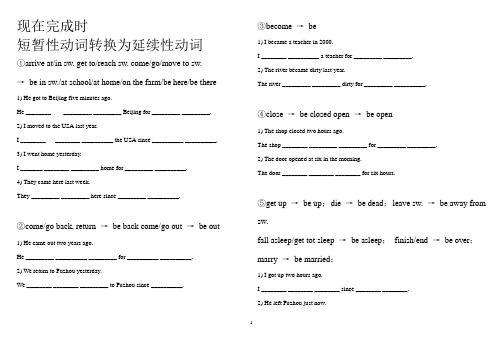
现在完成时短暂性动词转换为延续性动词①arrive at/in sw. get to/reach sw. come/go/move to sw.→be in sw./at school/at home/on the farm/be here/be there 1) He got to Beijing five minutes ago.He ________ _________ _________ Beijing for _________ _________.2) I moved to the USA last year.I ________ ________ __________ the USA since __________ __________.3) I went home yesterday.I _______ ________ _________ home for _________ __________.4) They came here last week.They _________ _________ here since _________ __________.②come/go back, return →be back come/go out →be out1) He came out two years ago.He _________ __________ _________ for __________ __________.2) We return to Fuzhou yesterday.We ________ ________ _________ to Fuzhou since __________. ③become →be1) I became a teacher in 2000.I ________ __________ a teacher for _________ _________.2) The river became dirty last year.The river _________ _________ dirty for _________ __________.④close →be closed open →be open1) The shop closed two hours ago.The shop ________ _________ _________ for _________ _________.2) The door opened at six in the morning.The door ________ ________ ________ for six hours.⑤get up →be up;die →be dead;leave sw. →be away from sw.fall asleep/get tot sleep →be asleep;finish/end →be over;marry →be married;1) I got up two hours ago.I ________ ________ ________ since ________ ________.2) He left Fuzhou just now.He _______ ________ ________ _________ Fuzhou for five minutes.3) My grandpa died in 2002.My grandpa _______ _______ ________for _______ ________.4) The meeting finished at six.The meeting ________ ______ ______ for six hours.5) I got to sleep two hours ago.I ________ _________ _________ since _________ _________.6) They married in 1990.They ________ _________ __________since _________.⑥start/begin to do sth. →do sth. ;begin →be on1) I began to teach at this school in 1995.I ____ ____ at this school since ____.2) The film began two minutes ago.The film ____ ____ ____ for ____ ____.⑦borrow →keep;lose →not have ;buy →have ;put on →wearcatch/get a cold →have a cold;get to know →know1) They borrowed it last week.They _________ _________ it since __________ __________. 2) I bought a pen two hours ago.I _________ _________ a pen for ________ __________.3) I got to know him last year.I _______ _______ him since __________ __________.4) I put on my glasses three years ago.I __________ __________ my glasses for _________ _________.⑧have/has gone to →have been inHe has gone to Beijing.He ____ ____ _____ Beijing for two days.⑨join the league/the Party/the army→be a league/a Party member/a soldier→be a member of the league/the Party→be in the league/the Party/the army1) He joined the league in 2002.He ________ _________ a _________ _________ for two years.He _______ _________ a __________ ___________ the __________ for two years. He ____________ ___________ ___________ the league for two years.2) My brother joined the army two years ago.My brother ________ __________ a ___________ for ___________ ___________. My brother __________ ___________ in ____________ ___________ for two years.。
短暂性动词转延续性动词口诀记助 )

?短暂性动词转延续性动词borrow→keep,become→be,getup→beup,fallill→beill,puton→wear,comehere→b ehere,gothere→bethere,gettoknow→know,go(get)out→beout,fallasleep→beaslee p,get/catchacold→haveacolddie→bedead,open→beopen,end/finish→beover, begin/start→beon,join→bein/beamemberof,leave→beaway,come→bein/here,go →beaway/out,reach/arrive/getto→stay/bein第一招变成持续动词转成持续不用愁。
买来、得到变拥有,(buy/get/receive→have)借入一定变保留。
(borrow→keep)穿上变穿着,(puton→wear)感冒haveacold。
(get/catchacold→haveacold)开始做某事,to后动词持续的。
(cometoknow→know,start/begintostudy→study)到达变停留,也可bein、beat。
(reach/arrivein,at/getto→bein/at)第二招变成系表结构系表结构来解忧,be代become,get,fall和go。
(系动词become,get,fall,go→系动词be fallill→beill,go(get)out→beout,fallasleep→beasleep,getup→beup,)be后名、介、副和形,(be加名词、介词短语、副词、形容词构成系表结构)一切轻松能搞定。
去在那,来在这,回来回去beback。
(go→betherecome→beherecome/goback→beback)离开beaway,结束beover,开始在进行。
短暂性动词与延续性动词的转化
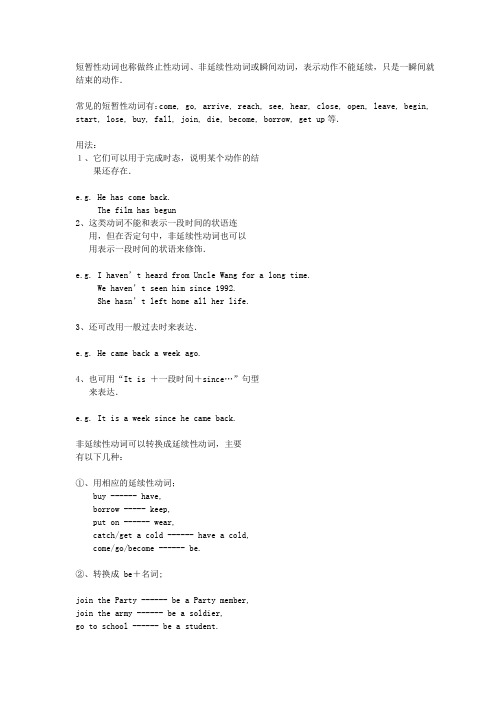
短暂性动词也称做终止性动词、非延续性动词或瞬间动词,表示动作不能延续,只是一瞬间就结束的动作.常见的短暂性动词有:come, go, arrive, reach, see, hear, close, open, leave, begin, start, lose, buy, fall, join, die, become, borrow, get up等.用法:1、它们可以用于完成时态,说明某个动作的结果还存在.e.g. He has come back.The film has begun2、这类动词不能和表示一段时间的状语连用,但在否定句中,非延续性动词也可以用表示一段时间的状语来修饰.e.g. I haven’t heard from Uncle Wang for a long time.We haven’t seen him since 1992.She hasn’t left home all her life.3、还可改用一般过去时来表达.e.g. He came back a week ago.4、也可用“It is +一段时间+since…”句型来表达.e.g. It is a week since he came back.非延续性动词可以转换成延续性动词,主要有以下几种:①、用相应的延续性动词;buy ------ have,borrow ----- keep,put on ------ wear,catch/get a cold ------ have a cold,come/go/become ------ be.②、转换成 be+名词;join the Party ------ be a Party member,join the army ------ be a soldier,go to school ------ be a student.③、转换成be + 介词短语 :go to school ------ be in school,join the army ------ be in the army.④、转换成be + adj./adv. :die ------ be dead, finish ------ be over,begin/start ------ be on, leave (…) ------ be away (from),close ------ be closed, open ------ be open,fall asleep ------ be asleep.巩固练习:(同义转换,每空一词)1.Li Lei joined the Party three years ago.Li Lei ()()()the Party ()three years ago.2009-11-20 04:54回复210.45.224.* 2楼Li Lei ()()()the Party()three years.() three years () Li Lei joined the Party.Three years ()()() Li Lei joined the Party.2.My father left Gucheng last week.My father ()()()() Gucheng () last week.My father ()()()() Gucheng () a week.3.The factory opened in 1996.The factory ()()()() ten years.The factory ()()() since 1996.4. His grandfather died five years ago.His grandfather ()()()since ()()() .His grandfather ()()()()five years.()five years ()his grandfather died.Five years ()()()his grandfather died.5. Mr. Wang reached Beijing five days ago.Mr. Wang ()()() Beijing()five days ago.Mr. Wang ()()() Beijing()five days.6. The film began ten minutes ago.The film ()()()for()().The film ()()()since ()()().答案1.has been in,sincehas been in,forIt's,sincehas passed since2.has been away from,sincehas been away from,for3.has been open forhas been open4.has been dead,five years agohas been dead forIt’s,sincehas passed since5.has been in,sincehas been in,for6.has been on,ten minuteshas been on,ten minutes ago7.has had,forhas had,since8.has kept,forhas kept,since9.has been,forhas been in,since10.have been in,forhave been in,since11.has been asleep,half an hourhas been asleep,half an hour ago请所有来过的人顶我下吧,毕竟打这么多也不容易...短暂性动词,延续性动词和现在完成时短暂性动词是指动作一旦发生就立即结束。
短暂性动词与延续性动词详解-转换表

短暂性动词与延续性动词相互转换对应表语法讲解:1.现在完成时表示过去发生的某一动作或存在的状态,一直持续到现在,并可以和以for或since 引导的表示一段时间的状语连用,也可以用在以“how long”提问的句子中,句子中的谓语动词一般为延续性动词。
例:He has been away from Beijing for two years. = He left Beijing two years ago.When did the train arrive here B. How long ____ the train ____ here2.在现在完成时的肯定句中,非延续性动词作谓语动词时,不能和表示一段时间的状语连用。
但可以用其他句式来表示同一个意思。
例:Lucy has come back.The old man died 4 years ago. = The old man has been dead for 4 years.He has been away from Beijing for two years.= He left Beijing two years ago.= It is two years since he left Beijing.= Two years has passed since he left Beijing.3.非延续性动词可以在现在完成时的否定句中作谓语,并可以与for,since引导的时间状语连用,表示动作的延续过程。
例如:She hasn’t bought any new clothes since last year.I haven’t borrowed the book for a long time.。
英语语法专题——短暂性动词与延续性动词
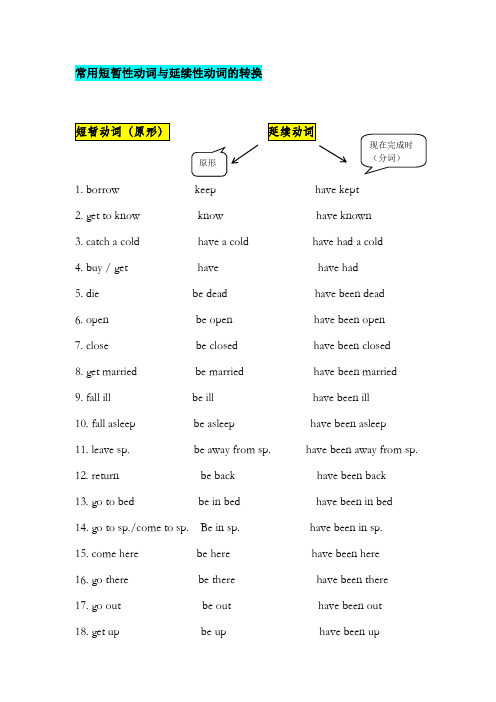
常用短暂性动词与延续性动词的转换1. borrow keep have kept2. get to know know have known3. catch a cold have a cold have had a cold4. buy / get have have had5. die be dead have been dead6. open be open have been open7. close be closed have been closed8. get married be married have been married9. fall ill be ill have been ill 10. fall asleep be asleep have been asleep 11. leave sp. be away from sp. have been away from sp. 12. return be back have been back 13. go to bed be in bed have been in bed 14. go to sp./come to sp. Be in sp. have been in sp. 15. come here be here have been here 16. go there be there have been there 17. go out be out have been out 18. get upbe uphave been up19. start/ begin be on have been on20. finish/ end be over have been over21. become be have been22. join be a member of have been a member ofbe in have been in23.begin / start be on have been on24.arrive be here/there/in ... have been here/there/in...25.put on wear 或be on have worn / have been on瞬时动词语法要点:我们以最常用的瞬时动词go为例,将相关知识点进行梳理如下。
短暂动词对应延续性动词变化
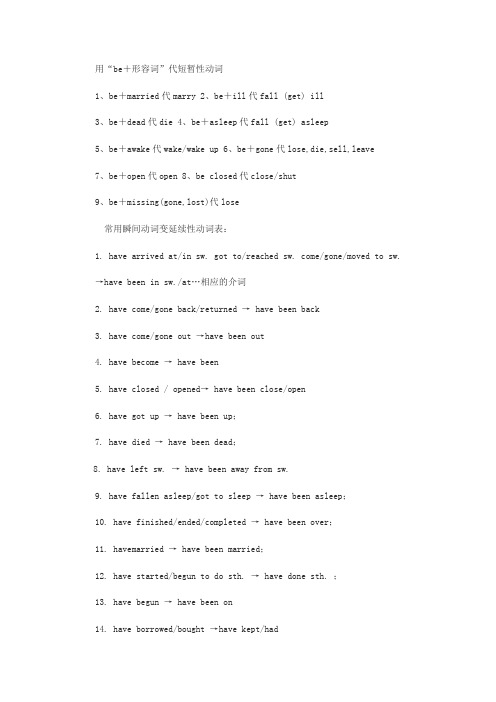
用“be+形容词”代短暂性动词1、be+married代marry2、be+ill代fall (get) ill3、be+dead代die4、be+asleep代fall (get) asleep5、be+awake代wake/wake up6、be+gone代lose,die,sell,leave7、be+open代open 8、be closed代close/shut9、be+missing(gone,lost)代lose常用瞬间动词变延续性动词表:1. have arrived at/in sw. got to/reached sw. come/gone/moved to sw. →have been in sw./at…相应的介词2. have come/gone back/returned → have been back3. have come/gone out →have been out4. have become → have been5. have closed / opened→ have been close/open6. have got up → have been up;7. have died → have been dead;8. have left sw. → have been away from sw.9. have fallen asleep/got to sleep → have been asleep;10. have finished/ended/completed → have been over;11. havemarried → have been married;12. have started/begun to do sth. → have done sth. ;13. have begun → have been on14. have borrowed/bought →have kept/had15. have lost → haven’t had16. have put on →have worn17. have caught /get a cold → have had a cold;18. have got to know → have known19. have/has gone to → have been in20. have joined/have taken part in the league/the Party/the army延续性动词与非延续性动词之间的转换:leave --- be away, borrow --- keep, buy --- have, begin/start --- be on, die --- be dead, finish --- beover, join --- be in+组织机构, be a member of+组织机构, open sth --- keep sth open, fall ill --- be ill, get up---be up, catch a cold ---have a cold, come here --- be here, go there --- be there, become--- be, come back --- be back, fall asleep --- be asleep, getto/ arrive/reach --- be (in), leave --- be away from, get to know--- know, go (get) out →be out,put on→ wear;catch a cold →have acold。
2021年延续性动词和短暂性动词转换归纳
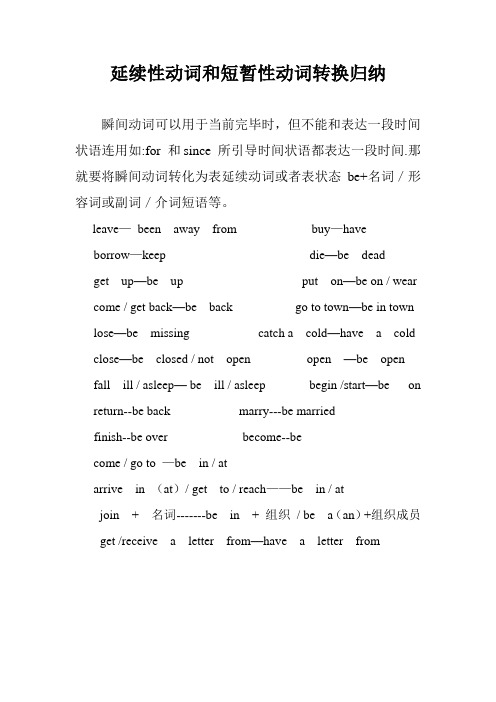
延续性动词和短暂性动词转换归纳瞬间动词可以用于当前完毕时,但不能和表达一段时间状语连用如:for 和since 所引导时间状语都表达一段时间.那就要将瞬间动词转化为表延续动词或者表状态be+名词/形容词或副词/介词短语等。
leave—been away from buy—haveborrow—keep die—be deadget up—be up put on—be on / wear come / get back—be back go to town—be in town lose—be missing catch a cold—have a cold close—be closed / not open open —be open fall ill / asleep— be ill / asleep begin /start—be on return--be back marry---be marriedfinish--be over become--become / go to —be in / atarrive in (at)/ get to / reach——be in / atjoin + 名词-------be in + 组织/ be a(an)+组织成员get /receive a letter from—have a letter from一看时间状语。
如果句中没有表达过去确切时间状语,惯用当前完毕时;如果有,则只能用普通过去时。
如:I have visited the factory.I visited the factory last year.二看句首有无疑问词。
如果笼统地问人家做过某事了吗(句首无疑问词),惯用当前完毕时;但进一步询问何时、何地、何因素、用什么方式做那事时(句首有疑问词)就要用普通过去时。
如:-Have you had your breakfast?-Yes,I have.-When did you have it? -At seven thirty.注意:这种用法是以连贯性问答为背景。
英语中的短暂变延续
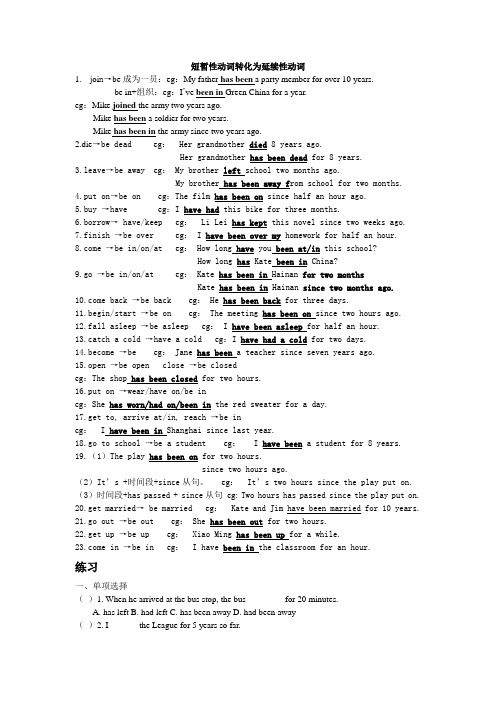
短暂性动词转化为延续性动词1.joi n→be成为一员:eg:My father has been a party member for over 10 years.be in+组织:eg:I’ve been in Green China for a year.eg:Mike joined the army two years ago.Mike has been a soldier for two years.Mike has been in the army since two years ago.2.die→be dead eg: Her grandmother died 8 years ago.Her grandmother has been dead for 8 years.3.leave→be away eg: My brother left school two months ago.My brother has been away f rom school for two months.4.put on→be on eg:The film has been on since half an hour ago.5.buy →have eg:I have had this bike for three months.6.borrow→ have/keep eg: Li Lei has kept this novel since two weeks ago.7.finish →be over eg: I have been over my homework for half an hour.e →be in/on/at eg: How long have you been at/in this school?How long has Kate been in China?9.go →be in/on/at eg: Kate has been in Hainan for two monthsKate has been in Hainan since two months ago.e back →be back eg: He has been back for three days.11.begin/start →be on eg: The meeting has been on since two hours ago.12.fall asleep →be asleep eg: I have been asleep for half an hour.13.catch a cold →have a cold eg:I have had a cold for two days.14.become →be eg: Jane has been a teacher since seven years ago.15.open →be open close →be closedeg:The shop has been closed for two hours.16.put on →wear/have on/be ineg:She has worn/had on/been in the red sweater for a day.17.get to, arrive at/in, reach →be ineg: I have been in Shanghai since last year.18.go to school →be a student eg: I have been a student for 8 years.19.(1)The play has been on for two hours.since two hours ago.(2)It’s +时间段+since从句。
短暂性动词与延续性动词详解转换表及练习(终审稿)

短暂性动词与延续性动词详解转换表及练习文稿归稿存档编号:[KKUY-KKIO69-OTM243-OLUI129-G00I-FDQS58-短暂性动词与延续性动词相互转换对应表语法讲解:1.现在完成时表示过去发生的某一动作或存在的状态,一直持续到现在,并可以和以?for或since引导的表示一段时间的状语连用,也可以用在以“how?long”提问的句子中,句子中的谓语动词一般为延续性动词。
例:HehasbeenawayfromBeijingfortwoyears.=HeleftBeijingtwoyearsago. WhendidthetrainarrivehereB.Howlong____thetrain____here2.在现在完成时的肯定句中,非延续性动词作谓语动词时,不能和表示一段时间的状语连用。
但可以用其他句式来表示同一个意思。
例:Lucyhascomeback.Theoldmandied4yearsago.=Theoldmanhasbeendeadfor4years. HehasbeenawayfromBeijingfortwoyears.=HeleftBeijingtwoyearsago.=ItistwoyearssinceheleftBeijing.=TwoyearshaspassedsinceheleftBeijing.3.非延续性动词可以在现在完成时的否定句中作谓语,并可以与for,since引导的时间状语连用,表示动作的延续过程。
例如:Shehasn’tboughtanynewclothessincelastyear.I?haven’tborrowedthebo okforalongtime.巩固习题:1.Whenhearrivedatthebusstop,thebus________for20minutes.A.hasleftB.hadleftC.hasbeenawayD.hadbeenaway2.I______theLeaguefor5yearssofar.A.joinedB.havejoinedC.havebeenin3.Thefactory________sincetheFebruaryof1988.A.hasbeenopenB.hasopenedC.wasopenD.opened4.MaryandRose_______friendssincetheymetin2000.A.havemadeB.havebeenC.madeD.havebecome5.Themeeting_______foraweeknow.A.hasfinishedB.hasendedC.hasbeenover6.MissGao______thisschoolfornearly5years.A.hasbeeninB.hascometoC.hastaught7.Ben______ateacherfor4years.A.hasbeenB.hasbecomeC.wasD.became8.I______homeforaweek.A.havereturnedB.havebeenbackC.returned9.Howlong_______he________A.diedB.has,diedC.has,beendead10.-----HowlongcanI______thebook------Twoweeks.A.borrowB.lendC.getD.keep11.He________thecarforaweek.A.boughtB.hasboughtC.hashad12.-----Howlong_____you_____ill-----Twoweeks.A.didfallB.have,fellC.have,been13.Since2000,he_____hishometown.A.hasleftB.hasmovedawayC.hasbeenawayfrom14.I'lllendyouthebook,butyoucanonly_____itfor2days.A.borrowB.keepC.take15.Thebus______ontheroadfor2hourssofar.A.hasstoppedB.stoppedC.hasbeen16.Tomisillinhospital.He_______acoldforseveraldays.A.isB.catchesC.hascaughtD.hashad17.He________for2hours.A.gotupB.hasgotupC.hasbeenup。
动词短暂性转延续性的记忆口诀
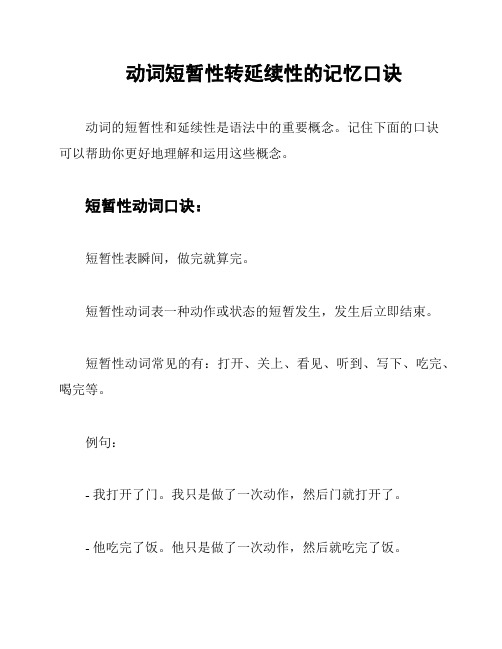
动词短暂性转延续性的记忆口诀
动词的短暂性和延续性是语法中的重要概念。
记住下面的口诀
可以帮助你更好地理解和运用这些概念。
短暂性动词口诀:
短暂性表瞬间,做完就算完。
短暂性动词表一种动作或状态的短暂发生,发生后立即结束。
短暂性动词常见的有:打开、关上、看见、听到、写下、吃完、喝完等。
例句:
- 我打开了门。
我只是做了一次动作,然后门就打开了。
- 他吃完了饭。
他只是做了一次动作,然后就吃完了饭。
延续性动词口诀:
延续性表延续,没完还在继续。
延续性动词表一种动作或状态的延续发生,持续一段时间或直
到另一个动作发生。
延续性动词常见的有:工作、研究、睡觉、生活、喜欢、了解、拥有等。
例句:
- 我正在工作。
我一直在做这个动作,还没有结束。
- 她喜欢读书。
她一直有这个喜好,没有停止过。
口诀的要点就是短暂性动词表示瞬间动作,并且发生后就结束了;而延续性动词表示持续性动作,持续一段时间或者一直持续到
另一个动作的发生。
记住这些特点,可以帮助我们准确地使用动词的短暂性和延续性,提升我们的语言表达能力。
以上是关于动词短暂性转延续性记忆口诀的内容。
希望对您有帮助!。
初中英语短暂性动词如何变成延续性动词

典例
他参军2年。1.He joined the army(部队)two
years ago. 2.He has been in the army for two years. = since two years ago. 3.He has been a soldier for two years. 4.It is 2 years since he joined the army. It has been 2 years since he joined the army. 5.2 years has passed since he joined the army.
记住下面典例
他入党20年。1.He joined the Party 20 ቤተ መጻሕፍቲ ባይዱears ago.
2.He has been in the Party for 20 years. = since 20 years ago. 3.He has been a Party member for 20 years. 4.It is 20 years since he joined the Party. =It has been 20 years since he joined the Party. 5.20 years has passed since he joined the Party.
buy→have had borrow/lend→keep become→have been catch/get a cold→have had a cold put on→have worn marry→have been married fall/get ill→have been ill die→have been dead
短暂性动词与延续性动词详解,转换表及练习
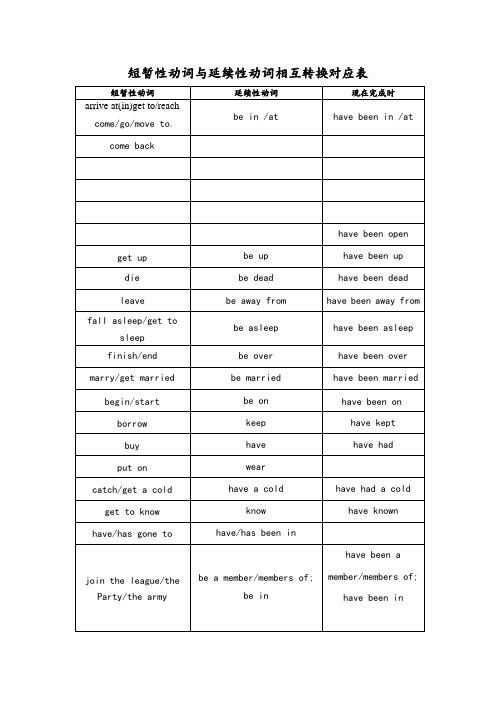
短暂性动词与延续性动词相互转换对应表语法讲解:1.现在完成时表示过去发生的某一动作或存在的状态,一直持续到现在,并可以和以for或since引导的表示一段时间的状语连用,也可以用在以“how long”提问的句子中,句子中的谓语动词一般为延续性动词。
例:He has been away from Beijing for two years. = He left Beijing two years ago.When did the train arrive here B. How long ____ the train ____ here2.在现在完成时的肯定句中,非延续性动词作谓语动词时,不能和表示一段时间的状语连用。
但可以用其他句式来表示同一个意思。
例:Lucy has come back.The old man died 4 years ago. =The old man has been dead for 4 years.He has been away from Beijing for two years.= He left Beijing two years ago.= It is two years since he left Beijing.= Two years has passed since he left Beijing.3.非延续性动词可以在现在完成时的否定句中作谓语,并可以与for,since引导的时间状语连用,表示动作的延续过程。
例如:She hasn’t bought any new clothes since last year.I haven’t borrowed the book for a long time.巩固习题:1. When he arrived at the bus stop, the bus ________ f or 20 minutes.A. has leftB. had leftC. has been awayD. had been away2. I ______ the League for 5 years so far.A. joinedB. have joinedC. have been in3. The factory ________ since the February of 1988.A . has been open B. has opened C. was open D. opened4. Mary and Rose _______friends since they met in 2000.A. have madeB. have beenC. madeD. have becomemeeting _______ for a week now.A. has finishedB. has endedC. has been overGao ______ this school for nearly 5 years.A. has been inB. has come toC. has taught______ a teacher for 4 years .A. has beenB. has becomeC. wasD. became8. I ______ home for a week.A. have returnedB. have been backC. returned9. How long _______ he ________A. diedB. has, diedC. has, been dead10. ----- How long can I ______ the book ------ Two weeks.A. borrowB. lendC. getD. keep________ the car for a week.A. boughtB. has boughtC. has hadlong _____ you _____ ill -----Two weeks.A. did fallB. have, fellC. have, been2000, he _____ his hometown.A. has leftB. has moved awayC. has been away fro m'll lend you the book , but you can only _____ it for 2 days.A. borrowB. keepC. takebus ______ on the road for 2 hours so far.A. has stoppedB. stoppedC. has been16. Tom is ill in hospital. He _______ a cold for several days.A. isB. catchesC. has caughtD. has ha d________ for 2 hours.A. got upB. has got upC. has been up。
- 1、下载文档前请自行甄别文档内容的完整性,平台不提供额外的编辑、内容补充、找答案等附加服务。
- 2、"仅部分预览"的文档,不可在线预览部分如存在完整性等问题,可反馈申请退款(可完整预览的文档不适用该条件!)。
- 3、如文档侵犯您的权益,请联系客服反馈,我们会尽快为您处理(人工客服工作时间:9:00-18:30)。
短暂性动词与延续性动词的转换
1. borrow keep have kept
2. get to know know have known
3. catch a cold have a cold have had a cold
4. buy have have had
5. die be dead have been dead
6. open be open have been open
7. close be closed have been closed
8. get married be married have been married
9. fall ill be ill have been ill
10. fall asleep be asleep have been asleep
11. leave sp. be away from sp. Have been away from sp.
12. return be back have been back
13. go to bed be in bed have been in bed
14. come to the island be on the island have been on the island
15. go to sp./come to sp. be in sp. Have been in sp.
16. come here be here have been here
17. go there be there have been there
18. go out be out
have been out
19. get up be up have been up
20. start/ begin be on have been on
21. finish/ end be over have been over
22. become be have been
23. join be a member of have been a member of
be in have been in
arrive →be here begin(start)→ be on
die →be dead come back→ be back
leave →be away (from) fall ill(sick, asleep)→be ill(sick, asleep)
get up→be up go out →be out
finish →be over put on →wear 或be on
open →be open join →be in或be a member of…close →be closed go to school→ be a student
borrow →keep buy/get →have
catch(a cold)→ have(a cold) move to → live in
come to → be in
marry → be married
sit down → be seated
dress → be dressed
finish/end → be over
get to know →know
begin to study →study
come to work→ work
短暂性动词和延续性动词
可以从字面上理解,持续的动作就是延续动词,反之就是瞬间动词(短暂动词),这个有这种感觉还是很好理解的,你看看下面的词吧。
延续性动词: live,run,stay,clean,play,hold,wat ch,teach,read,study,teach,eat, drink,write,dance, sing,smoke
瞬间性动词:
open,stop,like,love,die,win,close, shot,begin,start enter,finish
终止性动词:表示不能延续的动作,即动作发生后立即结束。
如:begin,arrive,borrow,buy,break,cl ose,come,fall,dic,finish,go,leave,
lend,mary,reach,receive,open,s ell,start,stop等。
终止性动词的肯定式是不能持续的,所以不能和表示一段时间的状语连用,而终止性的否定式就可以和表一段时间的状语连用,因为否定本身就是可以延续的。
如:have a cold是持续性动词,表示“状态”,可与表延续性的时间状语连用,不定冠词不能省略。
I′ve had a cold since my arrival.(到达n.)
I didn′t go to school because I had had a bad cold for days.
catch a cold是短暂性动作,表“动态”:它不能和延续性时间状语连用,不定冠词“a”可有可无,catch 可用take,get代替。
.
但是,若cold前有形容词修饰时,则不定冠词不能省。
如:Brown has taken a slight cold.
注意下列句子:
I have caught a cold for over a week.(×)
I have had a cold for over a week.( )
2、延续性动词:表示可以延续一段时间的动作或状态。
如:
be,drink,fly,eat,keep,lie,live,rain 等。
延续性动词常不能和表示一个短暂具体的时间状语连用;这类动词如用于进行时态,则可以和表示一个短暂具体的时刻连用。
He worked at eight yesterday afternoon.(×)
He was working at eight yesterday afternoon.( )
3、代替终止性动词的方法
a)用延续性动词代替终止性动词
1、用have代替buy
My brother has had(不能用has bought) this bike for almost four years.
2、用keep或have代替borrow
I have kept(不能用have borrowed) the book for quite a few days.
3、用be替代become
How long has your sister been a teacher?
4、用have a cold代替catch a
cold
Tom has had a cold since the day before yesterday.
5、用wear代替put on
b)用“be+形容词”代终止性动词
1、be+married代marry
2、be+ill代fall (get) ill
3、be+dead代die
4、be+asleep 代fall (get) asleep
5、be+awake代wake/wake up
6、be+gone代lose,die,sell,leave
7、be+open代open 8、be closed 代close/shut
9、be+missing(gone,lost)代lose
c)用“be+副词”代终止性动词
1“be+on”代start,begin
2“be+up”代get up
3“be+back(to)”代return to,come back to,go back to
4“be here (there)”代come(arrive,reach,get) here或go (arrive,reach,get) there等等
d)用“be+介词短语”代终止性动词
1.“be in/at +地点”代替go to /come to
2.用be in the army 代替join the
army
3.“be in/at +地点”代替move to。
